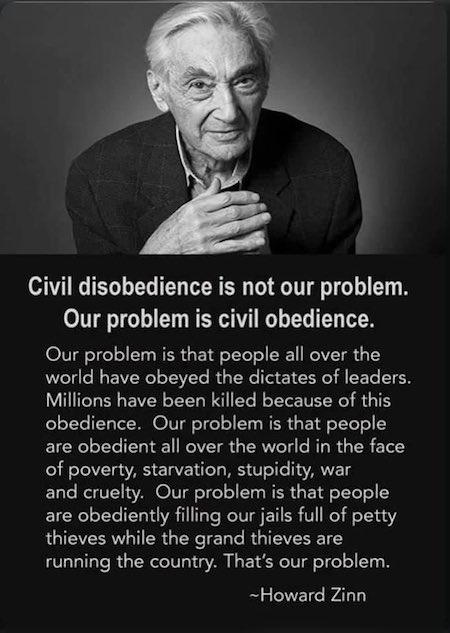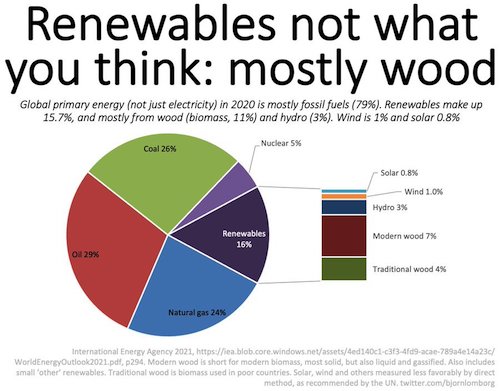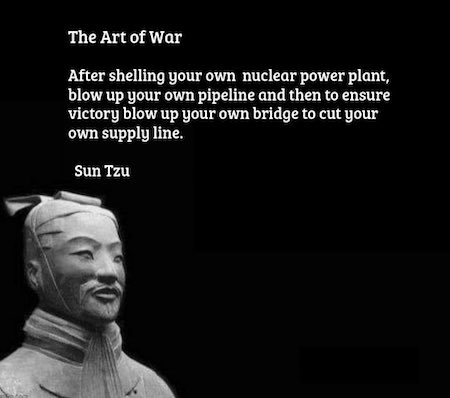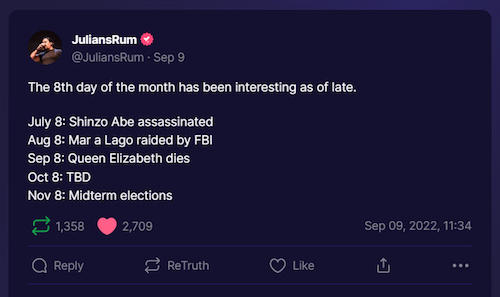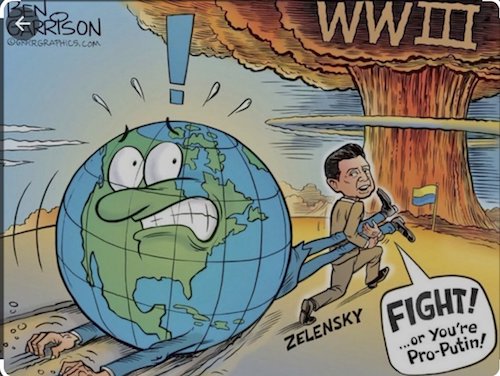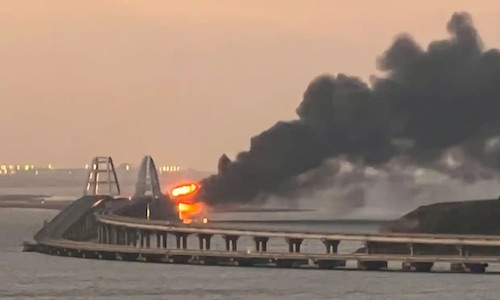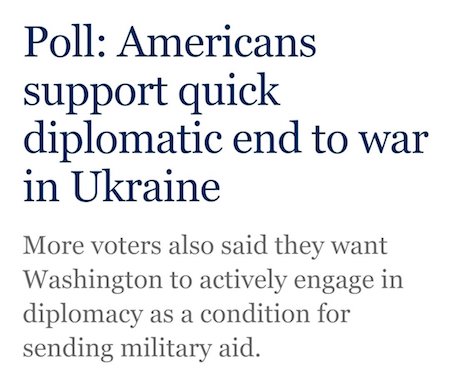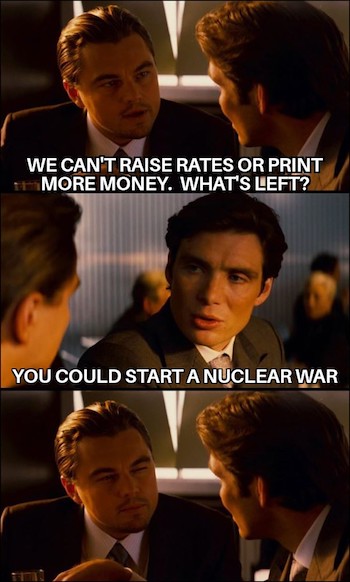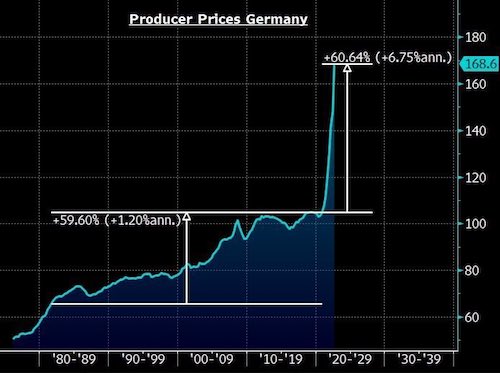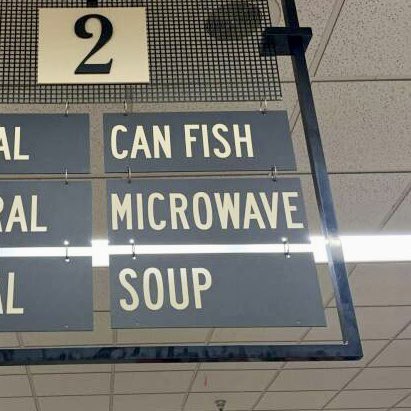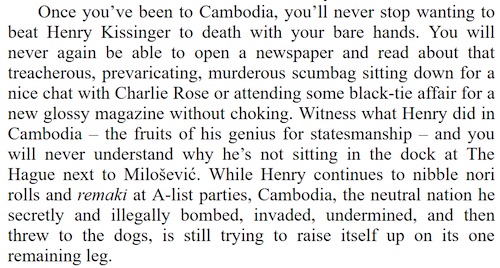
Salvador Dali Llane Beach, Cadaques 1919

Every high civilization decays by forgetting obvious things.
– G.K. Chesterton



Terhes
https://twitter.com/i/status/1583069992605876224

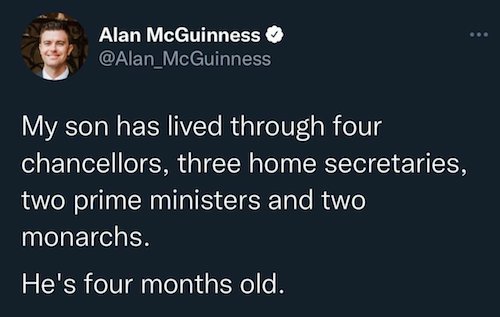

Gaddafi
11 years ago today, Muammar Gaddafi was killed.
3 years before his death, he warned the Arab League:"An entire Arab Leadership was executed by hanging.
Any one of you might be next.
We are friends of America but one of these days, America may hang us." pic.twitter.com/TZDjvsmO0a
— In Context (@incontextmedia) October 20, 2022

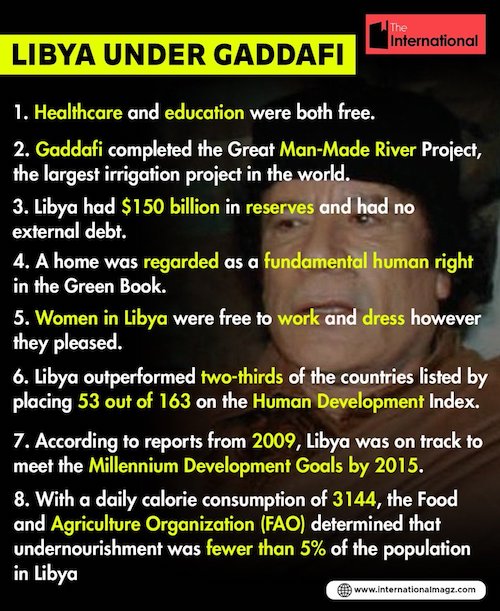

Zakharova
https://twitter.com/i/status/1583048680512180224

Deindustrialization in Europe
– fertilizer down 70%
– aluminum down 50%
– silicon down 27%
– steel down 17%
– paper & packaging down 15%
– 100% of zinc smelters shut or curtailed
– total chem industry set to decline 40%Due to nat gas shortages
Biden still refuses to help pic.twitter.com/n5y3BLqkyZ
— Michael Shellenberger (@ShellenbergerMD) October 19, 2022

Amazon books Tucker
Why is Amazon banning books from prominent authors they don’t like? We investigate. pic.twitter.com/hUOAxfwOMI
— Tucker Carlson (@TuckerCarlson) October 20, 2022


Will the GOP turn its back on Raytheon? Maybe they reckon this cannot be taken any further, that too many impoverished Americans will turn their backs on them. November 8.
• US May End Aid To Ukraine After Midterms – Axios (RT)
The extensive assistance provided by Washington to Ukraine amid its conflict with Russia may be cut if the Republican Party takes control of Congress in the midterm elections on November 8, Axios has reported. Even the harshest critics of Vladimir Putin among the Republicans now acknowledge that there’s been a “noticeable shift away from what was once a broad bipartisan consensus” on providing aid to Kiev, the outlet reported on Wednesday. It cited House minority leader Kevin McCarthy, who told Punchbowl News earlier this week: “I think people are gonna be sitting in a recession and they’re not going to write a blank check to Ukraine. They just won’t do it. ”Ukraine might be important, but it can’t be the only thing on the agenda of the US administration, he insisted.
Republican Congressman Don Bacon also said he’d “noticed” a decline in support for Ukraine. “You see it a little bit on social media, you see it with some of our members,” he said. Bacon’s colleague Kelly Armstrong told Axios that the mood swing was likely a result of the feedback that the lawmakers had been getting from their constituents. “When people are seeing a 13% increase in grocery prices; energy, utility bills doubling… if you’re a border community and you’re being overrun by migrants and fentanyl, Ukraine is the furthest thing from your mind,” he pointed out. The website also cited a senior House Republican, who claimed that “after the $40 billion [in aid package in May], there were a lot of Republicans saying: ‘This is the last time I’m going to support Ukraine funding.’”
In a comment to Axios, Congressman Jim Banks, who chairs the Republican Study Committee (RSC), pointed out that his party is going to focus on domestic issues after the midterms. “RSC believes you can’t lead abroad when you’re so weak at home. Our GOP agenda in the new majority needs to secure our own border and get America back on our feet by addressing energy cost and inflation,” he explained. Asked to comment on McCarthy’s remarks, White House spokeswoman Karine Jean-Pierre insisted that the Biden administration would “continue to work with Congress, as we have these past several months, on these efforts and support Ukraine as long as it takes.”Jean-Pierre reminded that this was a“commitment” that Joe Biden made to Ukrainian President Vladimir Zelensky.
White House aides told Politico on Wednesday that the Biden administration hadn’t warned Kiev about the possibility of US aid coming to an end in the event that Republicans take control of at least one chamber of Congress after the election. However, officials in Kiev are aware that this may happen, they said. The US has been Kiev’s biggest backer since the outbreak of its conflict with Russia in late February, providing Kiev with more than $16.8 billion in military aid, including sophisticated hardware such as HIMARS multiple rocket launchers, M777 howitzers, and combat drones. Moscow has been decrying those weapons deliveries, saying they only prolong the fighting and increase the risk of a direct confrontation between Russia and NATO.

Major threat to Meloni’s new coalition. Just because he’s right.
“Giorgia Meloni, who has been tasked with forming a new Italian government, stated that people who do not share a pro-NATO stance would have no place in her coalition.”
• Berlusconi Trashes NATO Narrative On Ukraine (RT)
Former Italian Prime Minister Silvio Berlusconi has reportedly claimed that Kiev triggered a conflict with Russia by reneging on a peace plan for eastern Ukraine, a tape provided to the media suggests. In an apparent response to the leak, Giorgia Meloni, who has been tasked with forming a new Italian government, stated that people who do not share a pro-NATO stance would have no place in her coalition. Speaking to members of his Forza Italia party on Tuesday, Berlusconi reportedly offered a viewpoint about the origin of the Ukraine crisis that clashed with the NATO-favored narrative of unprovoked Russian aggression against its neighbor.
Italy is an important member of the US-led alliance and anyone who disagrees with this position will be excluded from government, Meloni, the leader of the Brothers of Italy party, pledged on Wednesday evening, as quoted by the newspaper La Repubblica. In the audio clip, Berlusconi can be heard accusing Kiev of failing for years to uphold a peace deal with the Donetsk and Lugansk People’s Republics. When Ukrainian President Vladimir Zelensky came to power in 2019, he “tripled down” on attacking the regions, the politician stated. Donetsk and Lugansk asked for Moscow’s protection, he continued. Russian President Vladimir Putin sent troops into Ukraine in the hope that Zelensky would be overthrown and replaced with “good people of common sense” within a couple of weeks, Berlusconi claimed. The wording resembles what he told the Italian public broadcaster RAI after the September election. During this week’s meeting, Berlusconi allegedly suggested that the conflict in Ukraine could last for over “200 years,”after the country unexpectedly resisted Russia and received money and arms from Western nations to continue the fighting.
In another part of the recording, which was published by the LaPresse news agency, Berlusconi claimed to have received a crate of vodka and a “nice letter” from Putin for his birthday. He added that he responded by sending Lambrusco wine to the Russian leader. After the clip was released, the former prime minister’s party claimed he had been referring to historical contacts with Putin and not recent events. Berlusconi has a long record of friendly relations with Putin, which stretched beyond his tenure as prime minister. The three-time former leader of the Italian government’s participation in the right-wing coalition has resulted in claims that the country could make a foreign policy U-turn and oppose the US-led anti-Russian campaign under Meloni. She repeatedly pledged her support for the EU and NATO after winning the election.

“I responded with 20 bottles of Lambrusco and a similarly sweet letter..”
• Putin’s Gift To Berlusconi May Have Breached EU Sanctions (RT)
A case containing 20 bottles of vodka that Russian President Vladimir Putin allegedly sent to former Italian Prime Minister Silvio Berlusconi as a birthday gift may have violated EU sanctions, Der Spiegel reported on Thursday, citing an official comment from the European Commission to the DPA news agency. According to the statement, a spokeswoman for the Commission told the news agency that the April 2022 ban on goods imports from Russia to the EU includes spirits, namely vodka, and does not provide an exemption for gifts. The spokeswoman went on to explain that breaches of the sanctions can be reported to the competent national authorities of member states, or directly to Brussels. The news that Putin had sent the gift to Berlusconi was reported by Italy’s LaPresse news agency earlier this week.
The outlet released an audio recording of the former prime minister’s discussion with members of his party, Forza Italia, at a closed meeting. “I have reconnected with President Putin… He sent me 20 bottles of vodka and a really sweet letter for my birthday. I responded with 20 bottles of Lambrusco and a similarly sweet letter,” Berlusconi was heard saying in the recording. However, Forza Italia representatives later said that the former PM was not referring to his most recent birthday on September 29, 2022, but instead was telling “an old story to lawmakers about an episode that occurred years ago,” which means that EU sanctions may not apply at all. The party representatives added that “Berlusconi denies the news of alleged renewed relations with Vladimir Putin.”
However, later reports emerged, suggesting that the remarks were indeed made this year. The potential scandal comes just weeks after the 86-year-old politician returned to the Italian parliament, nine years after being forced out for alleged tax fraud. Previously, Putin and Berlusconi enjoyed a friendly relationship and often complimented one another. However, Berlusconi has lately been critical of Putin over Russia’s military operation in Ukraine, saying he was disappointed with the Russian leader, who he always considered “a man of democracy and peace.”

How much longer will Italy support NATO and its Ukraine attack?
• Power Costs In Italy Going Through The Roof (RT)
Electricity tariffs in Italy saw record growth last month, exceeding 136% on an annual basis, according to a National Union of Consumers report on Tuesday. The report said that in September, electricity prices came out on top in the ranking of the most expensive goods and services, which the union regularly compiles based on data from the Italian National Institute of Statistics (ISTAT). In the category of non-food products, electricity prices were followed by costs for air travel across Europe, which have risen 128% over the past year. Then came intercontinental flights, for which the prices almost doubled (97.4%). Gas tariffs increased by just under 64% in September.As for food products, the ranking was led by vegetable oils (with the exception of olive oil), up by almost 60%.
The prices of butter and rice rose 38% and 26.7% respectively. Other foodstuffs that saw price increases of more than 20% include pasta, canned milk, flour, and basic vegetables. “Only for food and drink, every single Italian family will pay an average of €660 more per year,” the consumer union’s president, Massimiliano Dona, said. He added that families with two children will have to pay €900 ($885) more, and those with three children, €1,075 ($1,057) more.Inflation in Italy climbed to 8.9% in September on an annualized basis, ISTAT data shows. Meanwhile, the ‘consumer basket’ saw a rise of 10.9% over the year. Such a high increase in the price of basic foodstuffs and personal goods has not been recorded in Italy since 1983.
The head of Italian energy think tank Nomisma Energia said this week that Italy, along with the rest of Europe, is experiencing an energy shock of unprecedented magnitude, as electricity prices have almost doubled. According to him, Italians should be ready for rationing during the coldest winter months. He also urged households to make use of alternative methods of heating, such as burning firewood and pellets, though he added that prices for these are also up.

Russia knows who did it.
• Zelensky Denies Kiev’s Role In Crimean Bridge Blast (RT)
Ukrainian President Vladimir Zelensky has denied “ordering” the bombing of the Crimean Bridge linking the peninsula to mainland Russia. The president made the remarks during an interview with the Canadian broadcaster CTV, aired on Wednesday. Asked to comment on the “spectacular attack” on the bridge, as the broadcaster put it, Zelensky said Kiev was not involved. “We definitely did not order that, as far as I know,” he told the reporters. The bridge was hit by a massive explosion on October 8, which severely damaged its road traffic section and killed three civilians, as well as setting a passing freight train on fire. Several top Ukrainian officials openly celebrated the attack, while the country’s postal service issued a stamp commemorating the blast, just hours after it happened.
Moscow has directly blamed Kiev for the incident, branding the explosion a “terrorist attack.” Russian law enforcement claims to have established how the bomb, which was disguised as construction materials, made it to the bridge from the Ukrainian port city of Odessa, via multiple transit countries. Russian investigators believe the plot was hatched by Ukrainian military intelligence. Moscow has identified 12 individuals as suspected accomplices in the plot and has arrested eight of them, the FSB said. The list of people in custody includes five Russians and three foreign nationals, who hold passports of Ukraine and Armenia. A spokesman for Ukrainian military intelligence told the media that the FSB was a “fake structure,” and that the report was unworthy of comment.

“..states begin to fail within 15 years of losing their main sources of energy and economic revenue..”
• Britain’s Stark Choice Ahead – Transformation or Collapse (Nafeez Ahmed)
Five years ago, I warned in a study that Europe faces an increasing risk of state failure due to the escalation of interlinked environmental, energy and economic crises – and I found an intriguing pattern: states begin to fail within 15 years of losing their main sources of energy and economic revenue. Escalating crisis drives social polarisation, undermining national cohesion and resulting in outbreaks of civil unrest. Without a change of course, these outbreaks coalesce to undermine the functioning of key state institutions. At worst, they can lead to total government collapse and a state of permanent warfare. Gripped by multiple crises, Britain now appears to be following a familiar pattern of environmental, energy and economic-driven state failure.
Since the 1970s, the world has experienced a rising trend of civil unrest and societal breakdown – in correlation with three realities: rising inequality associated with the neoliberal age of globalisation; escalating economic overshoot of the Earth’s ecological systems; and intensifying decline in the quality of fossil fuel energy resources. Britain’s North Sea Oil production peaked in 1999. Fifteen years later, as its domestic oil production haemorrhaged, fringe right-wing nationalist forces had moved increasingly into the mainstream. They blamed Europe, immigrants, asylum seekers, Muslims and ethnic minorities for Britain’s intractable social and economic crises. Their success was arguably reflected in the 2016 vote to leave the European Union. During that period, the quality of the UK’s energy dropped by a third, if not more.
In 2000, a year after the UK’s North Sea Oil production peaked, Britain’s ‘energy return on investment’ (EROI) – a ratio capturing the amount of energy used to extract a single unit of energy – was around 9.6. By 2012, this had plummeted to 6.2. This is well below the minimum EROI benchmark of 11 considered necessary to sustain continued economic growth. As a study by the University of Leeds’ Sustainability Research Institute concluded, this means that “more and more energy is having to be used in the extraction of energy itself rather than by the UK’s economy or society”. What is happening to Britain now is symptomatic of a wider global phenomenon. Its dependence on oil, gas and coal is self-cannibalising. The scientific consensus shows that it is driving us towards climate catastrophe and, at worst, civilisational collapse.

Only US LNG allowed.
• US Slams Turkey-Russia Deal to Form a Natural Gas Hub (GR)
The U.S. expressed on Wednesday its opposition to the agreement announced by Turkey for the creation of a natural gas hub in cooperation with Russia. Turkish President Tayyip Erdogan said on Wednesday that he had agreed with his Russian counterpart Vladimir Putin to form a natural gas hub in Turkey. Speaking to members of his AK Party in parliament, Erdogan said Putin had said Europe can obtain its gas supply from the hub in Turkey. “Türkiye will be a hub for natural gas as well. In our last meeting, we agreed with Putin on this issue. We will create a hub here with Turkish gas coming from Russia,” Erdogan said. The U.S. State Department fired back.
“We have worked closely with our allies and partners to impose severe and unprecedented costs on Russia, including through sanctions, export controls, visa restrictions. We have urged Turkey and all of our allies and partners that no one should have become a safe haven for illicit Russian assets or transactions, and we will continue to make that case,” Vedant Patel, State Department’s principal deputy spokesperson said. “And as it relates to the energy conversation, we have continued to urge our allies to take steps to diversify their energy sources, to reduce energy reliance on Russia. And in the case of Turkey, we are working with them closely to assist in their own efforts to enhance energy security in the long term,” he added.
Last month, on the sidelines of the Conference on Interaction and Confidence Building Measures in Asia summit in the Kazakh capital Astana, Erdogan held a closed-door meeting with Putin, who had proposed building a natural gas hub in Turkey. Putin has floated the idea of exporting more gas via the TurkStream gas pipeline running beneath the Black Sea to Turkey, touting the country as the best route for redirecting gas supplies to the European Union after the Nord Stream pipeline leaks. Erdogan previously said Russian and Turkish energy authorities would work together to designate the best location for the potential gas distribution center, adding that Turkey’s Thrace region, bordering Greece and Bulgaria, appeared to be the best spot.
Carrying natural gas from Russia to Turkey and further into Europe, the TurkStream was formally launched in January 2020. The pipeline, which allows Moscow to bypass Ukraine as a transit route to Europe, carries Russian gas to Southern Europe through the Black Sea and Turkey.

About Xi’s speech this week.
• Xi Gets Ready For The Final Countdown (Escobar)
Xi also did not mention the US by name. Everyone in the leadership – especially the new Politburo – is aware of how Washington wants to “decouple” from China in every possible way and will continue to provocatively deploy every possible strand of hybrid war. Xi did not enter into details during his speech, but it’s clear the driving force going forward will be technological innovation linked to a global vision. That’s where BRI comes in, again – as the privileged field of application for these tech breakthroughs. Only this way we can understand how Zhu Guangyao, a former vice minister of finance, may be sure that per capita GDP in China in 2035 would at least double the numbers in 2019 and reach $20,000.
The challenge for Xi and the new Politburo right away is to fix China’s structural economic imbalance. And pumping up debt-financed “investment” all over again won’t work. So bets can be made that Xi’s third term – to be confirmed later this week – will have to concentrate on rigorous planning and monitoring of implementation, much more than during his previous bold, ambitious, abrasive but sometimes disconnected years. The Politburo will have to pay way more attention to technical considerations. Xi will have to delegate more serious policymaking autonomy to a bunch of competent technocrats. Otherwise, we will be back to that startling observation by then Premier Wen Jiabao in 2007: China’s economy is “unstable, unbalanced, uncoordinated and ultimately unsustainable”. That’s exactly where the Hegemon wants it to be.
As it stands, things are far from gloomy. The National Development and Reform Commission states that compared to the rest of the world, China’s consumer inflation is only “marginal”; the job market is steady; and international payments are stable. Xi’s work report and pledges may also be seen as turning the usual Anglo-American geopolitical suspects – Mackinder, Mahan, Spykman, Brzezinski – upside down. The China-Russia strategic partnership has no time to lose with global hegemonic games; what drives them is that sooner rather than later they will be ruling the Heartland – the world island – and beyond, with allies from the Rimland, and from Africa to Latin America, all participating in a new form of globalization. Certainly with Chinese characteristics; but most of all, pan-Eurasian characteristics. The final countdown is already on.

The Ukraine conflict hinders China’s BRI. They want it to flow into Europe unimpeded.
• ‘Peaceful Modernization’: China’s Offering To The Global South (Escobar)
All over the extremely incandescent global chessboard, international relations are being completely reframed. China – and key Eurasian players at the Shanghai Cooperation Organization (SCO), BRICS+, and Russian-led Eurasian Economic Union (EAEU) – are all proposing peaceful development. In contrast, the Hegemon imposes an avalanche of sanctions – not by accident the top three recipients are Eurasian powers Russia, Iran and China; lethal proxy wars (Ukraine); and every possible strand of hybrid war to prevent the end of its supremacy, which lasted barely seven and a half decades, a blip in historical terms.
The current dysfunction – physical, political, financial, cognitive – is reaching a climax. As Europe plunges into the abyss of largely self-inflicted devastation and darkness – a neo-medievalism in woke register – an internally ravaged Empire resorts to plundering even its wealthy “allies”. It’s as if we are all witnessing a Mackinder-on-crack scenario. Halford Mackinder, of course, was the British geographer who developed the ‘Heartland Theory’ of geopolitics, heavily influencing US foreign policy during the Cold War: “Who rules East Europe commands the Heartland; Who rules the Heartland commands the World Island; Who rules the World Island commands the World.”
Russia spans 11 time zones and sits atop as much as one third of the world’s natural resources. A natural symbiosis between Europe and Russia is like a fact of life. But the EU oligarchy blew it. It’s no wonder the Chinese leadership views the process with horror, because one of BRI’s essential planks is to facilitate seamless trade between China and Europe. As Russia’s connectivity corridor has been blocked by sanctions, China will be privileging corridors via West Asia. Meanwhile, Russia is completing its pivot to the east. Russia’s enormous resources, combined with the manufacturing capability of China and East Asia as a whole, project a trade/connectivity sphere that goes even beyond BRI. That’s at the heart of the Russian concept of Greater Eurasia Partnership.

Critical mass.
• Saudi Arabia Is Interested In Joining The BRICS (Telesur)
At an interview on the South African Broadcasting Corporation on Tuesday, President Cyril Ramposa announced that Saudi Arabia is interested in joining BRICS, an economic cooperation organization made up of Brazil, Russia, India, China, and South Africa. “Crown Prince Mohammed bin Salman expressed the kingdom’s desire to join the BRICS,” the South African president said, adding that other countries are also interested in joining this organization. “In 2023, the BRICS summit will be held under the South African presidency and this request will be studied. Several countries are in contact with the BRICS and we have assured them that the accession issue will be discussed and a decision will be made,” Ramposa explained.
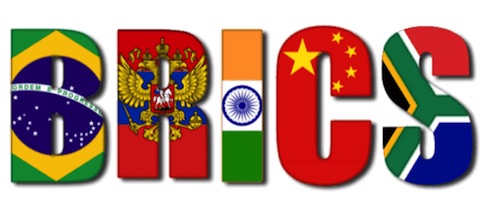
Among the nations that have already applied to join this international forum is Argentina, whose President Alberto Fernandez asked Chinese President Xi Jinping to join the BRICS. Sabino Vaca, Argentina’s ambassador to China, stated that the BRICS constitute an excellent cooperation alternative for developing countries given that the current world order has shown that it only works for the benefit of a few nations. At their 14th summit in July, the BRICS countries discussed economic cooperation options related to the creation of a new development bank, the formation of a contingent reserve arrangement, an intercountry payment system, and a BRICS basket reserve currency. Seen from the perspective of the global financial system, the consequence of those actions would be the gradual weakening of the U.S. dollar as an international reserve currency.

ZeroHedge: “Just as Musk wanted”, “And the thing is Musk will still end up owning it… just 80% cheaper under the next admin.”
• Biden Admin Weighs Blocking Twitter Deal On “National Security” Grounds (ZH)
One month ago we joked that should the Delaware judge force Musk to buy Twitter, then none other than the US government would step in and prevent the South African from gaining control over the blue-checkmark echo chamber of record, the one social media network which congressional testimony after congressional testimony has argued it can manipulate the outcome of elections. Well, that prediction is about to come true, because according to Bloomberg, the Biden administration is discussing whether the US should subject some of Elon Musk’s ventures to national security reviews, including the deal for Twitter and SpaceX’s Starlink satellite network, citing people familiar with the matter.
In short, not only is the
deep stategovernment preparing to block Musk’s acquisition of TWTR on national security grounds (unlcear what that would achieve as the stock would crater to single digits, especially after today’s SNAP earnings, and so many of its employees have already quit), but it may “expropriate” Musk’s satellite pet project too, all for daring to ask a question about the US involvement in Ukraine, and what exactly the endgame there is. As Bloomberg adds, “US officials have grown uncomfortable over Musk’s recent threat to stop supplying the Starlink satellite service to Ukraine — he said it had cost him $80 million so far — and what they see as his increasingly Russia-friendly stance following a series of tweets that outlined peace proposals favorable to President Vladimir Putin. They are also concerned by his plans to buy Twitter with a group of foreign investors.”The discussions are still at an early stage, the people familiar said on condition of anonymity. Officials in the US government and intelligence community are weighing what tools, if any, are available that would allow the federal government to review Musk’s ventures. One possible legal pathway is through the law governing the Committee on Foreign Investment in the United States to review Musk’s deals and operations for national security risks. The CFIUS was used extensively in the Trump admin to block and undo numerous Chinese deals, arguing they could pose a national threat to the US. Now, it’s none other than Musk who has emerged as the deep state’s biggest nemesis.
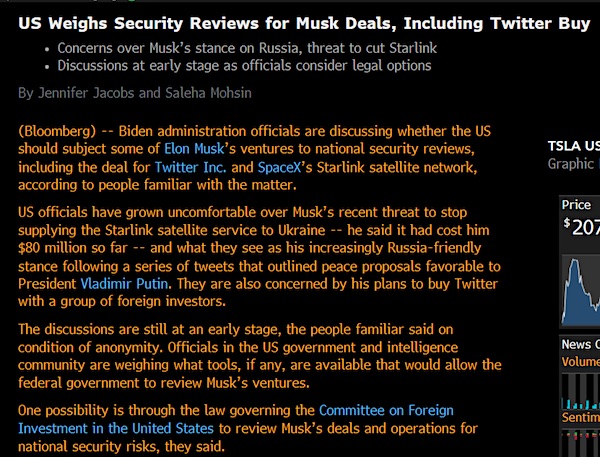

“..the company still maintains a $2,500 “liquidation” policy against accounts accused of “discrimination” and “hatred” as well as “intolerance”..”
• PayPal Faces House Inquiry On $2,500 ‘Misinformation’ Fine Controversy (JTN)
House Republicans are launching an inquiry into PayPal after the payment processing company sparked major controversy for a policy that would fine customers for “misinformation.” The controversy began when news broke earlier this month that PayPal would fine customers $2,500 for spreading misinformation. PayPal quickly retracted the policy, saying it was a mistake that “went out in error” but not before “cancelPayPal” was trending and Twitter users boasted of deleting their accounts. The company’s stocks tumbled as the news unfolded. Now, House Republicans want answers. They sent a letter to PayPal President and CEO Dan Schulman asking how the policy originated, who approved it, whether the Biden administration was involved, and more.
“As a leading financial technology company, it is concerning that a user agreement that contemplates the restriction of free speech was uploaded and disseminated to PayPal users – even if in error,” the letter said. “We understand your company is currently investigating this matter. Upon the conclusion of your investigation, we request that you provide a briefing for the Committees as soon as practicable.” [..] The letter requests answers by the end of the month to a range of questions, including whether any entities were affected by the policy change, when the internal investigation will be over, and who was responsible for the policy in question.
Critics also point out that while PayPal rescinded its misinformation policy, the company still maintains a $2,500 “liquidation” policy against accounts accused of “discrimination” and “hatred” as well as “intolerance” as the company chooses to define it. “The ability to transact without fear of retribution and political censorship is the foundation on which a free economy is built,” Emmer said. “We cannot afford to sacrifice these freedoms, and we must keep a close eye on any actions that erode them. The now-rescinded penalties outlined in PayPal’s Acceptable Use Policy were deeply concerning, and the American people deserve answers about how these decisions are made and whether their speech will be protected on this kind of platform.”

Dumping Treasuries.
• How An Illiquid Dollar Ruins The World (Piepenburg)
All of this scheming, leverage and swapping boils down to not enough available (i.e., liquid) USDs in a global financial system in which nearly everything—from debt, to oil to derivatives—still has to be paid in increasingly scarce and hence increasingly expensive Dollars. In addition to this twisted, illiquid and over-levered swamp, the USD rises even higher on Powell rate hikes, all of which combine to force the world’s other currencies to fall. Why? Because other countries and central banks have no choice but to swallow/import USD inflation, monetary policy and American political self-interest. Indeed, with financial allies like the U.S., who needs enemies?
Whenever the Fed, for example, prints more of the world reserve currency or raises its interest rate, the rest of the world, which is tied to that currency, is forced to react—i.e., debase, hike and suffer. We remind that nearly $14T in USD-denominated debt is owed by both emerging market and developed market economies. As the USD rises in strength on the back of Powell’s impossible Volcker-revival and tangled derivatives, other Dollar-desperate nations from Argentina to Japan find themselves with not enough Greenbacks to pay their debts or settle trades, wires and oil purchases, which thus forces them to print (i.e., debase) more of their local currencies to make USD-denominated payments.
But Japan takes the cake for debasing its own currency all on its own, as no nation has ever loved a money printer and currency-debaser more. This might explain why Japan is leading the charge in dumping its USTs into the FOREX markets, which only adds more pressure to rising yields and hence rising rates. Thanks Kuroda—just one more central banker with a mouse-clicker gone mad… Perhaps he’ll be next in line for a Nobel Prize? But Japan is not alone, as other nations dump the once sacred UST just to keep their currencies afloat…In short: The strong USD is crippling the word, and that world, as we’ve written numerous times, will be de-dollarizing at a steady and irreversible pace.No shocker there. At some point, Dollar-indebted nations crack and this twisted global game ends in a credit crisis for the history books.

“..they still won’t apologize..”
• It’s Been 2 Years Since 51 Intel Agents Interfered With An Election (Devine)
Exactly two years ago, on October 19, 2020, one of the dirtiest tricks in electoral history was played on the American people by 51 former intelligence officials, who used the false alarm of “Russian interference” to stop Donald Trump winning a second term as president. Using the institutional weight of their former esteemed roles, they signed a dishonest letter to mislead voters 15 days before the election, claiming that material from Hunter Biden’s laptop published by the New York Post “has all the classic earmarks of a Russian information operation.” In their expert opinion, “the Russians are involved in the Hunter Biden email issue.” Russia was “trying to influence how Americans vote in this election … Moscow [will] pull out the stops to do anything possible to help Trump win and/or to weaken Biden should he win.
“A ‘laptop op’ fits the bill, as the publication of the emails are [sic] clearly designed to discredit Biden … It is high time that Russia stops interfering in our democracy.” It was all a lie. Their letter was the culprit “interfering with democracy” in broad daylight. Not one of the 51 had seen any material from the laptop or bothered asking for it, but their letter, instigated by, signed and delivered to Politico by Democratic operative and former John Brennan aide Nick Shapiro, killed the story stone dead. It got candidate Joe Biden off the hook for the corrupt influence-peddling scheme his family had been running through the eight years of his vice presidency. The shameful letter was used by Joe Biden three days later, on October 22, to deflect Trump’s attack in their last debate.
“There are 50 former national intelligence folks who said that what he’s accusing me of is a Russian plan … Four, five former heads of the CIA, both parties, say what he’s saying is a bunch of garbage … You know his character. You know my character. You know my reputation is for honor and telling the truth … The character of the country is on the ballot.” Biden dismissed as a Kremlin smear all the evidence that was on his son’s laptop of dirty money from China and Russia, of all his meetings with Hunter’s overseas business partners, and all the lies he had told about his involvement in Hunter’s business deals The letter, like the Steele dossier and Russia collusion hoax peddled by many of the signatories, has helped fuel a moral panic about Russia in recent years that now has heightened the risk of nuclear war.

A three month study will not reveal the real damage done. That takes years. But already 1 in 500 is insanely high. And still the CDC is pushing it.
• One in Every 500 Small Children Who Get Pfizer Vaccine are Hospitalised (DS)
One in every 500 children under five years who received the Pfizer mRNA Covid vaccine were hospitalised with a vaccine injury, and one in 200 had symptoms ongoing for weeks or months afterwards, a study has found. The study published in JAMA included 7,806 children aged five or younger who were followed up of for an average of 91.4 days following their first Pfizer vaccination. It was a retrospective cohort study done as an authenticated online survey (response rate 41.1%) in spring 2022 which included parents or caregivers who registered children for SARS-CoV-2 vaccination in outpatient care facilities in Germany. It compared the adverse events to those of the same children with other vaccinations in order to control for over-reporting.
7 year old boy

It concluded that the symptoms reported after Pfizer vaccination were “comparable overall” to those for other vaccines. Let’s see. • Any symptoms: 62% higher • Musculoskeletal (muscles and bones) symptoms: 155% higher • Dermatologic (skin) symptoms: 118% higher • Otolaryngologic (ears, nose and throat) symptoms: 537% higher • Cardiovascular (heart etc.): 36% higher • Gastrointestinal (stomach etc.): 54% higher. It calls these “modestly elevated”. In 0.5% of the children (40 of 7,806) symptoms were “currently ongoing and thus of unknown significance”. This is in a study with a 2-4 month follow-up period. That means 0.5% of children had an adverse effect that lasted for weeks or months. In two cases (0.03%), symptoms were confirmed to have lasted longer than 90 days.
Ten children were hospitalised with reported serious adverse events (SAEs), compared to zero with the other vaccines. This reported as 0.1%, as it is out of 7,806. However, the study also states that no hospitalisations were reported for children administered the low dosage of 3 μg. Since it also tells us that 6,033 children received at least one dose of over 3 μg. (or unknown dosage), the rate in the relevant cohort is closer to 0.2%, or around one in 500. Four of the hospitalisations were for cardiovascular injury; one child was hospitalised after both doses for this reason. Four were pulmonary (lung) related. Symptoms of the hospitalised children lasted an average of 12.2 days and a maximum of 60 days. None reported a myocarditis diagnosis. Mercifully, no deaths were reported in this relatively small sample.
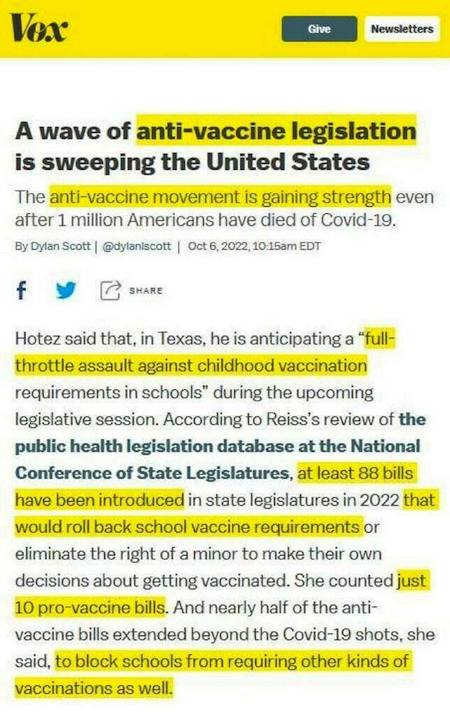




Knots
“Sometimes the easiest way to solve a problem is to stop participating in the problem.”pic.twitter.com/7W8DcbAk7e
— Vala Afshar (@ValaAfshar) October 19, 2022



Denzel
“If you don’t read the newspaper, you’re uninformed. If you do read it, you’re misinformed.”
~ Denzel Washingtonpic.twitter.com/dgZtkhLmXN
— James Melville (@JamesMelville) October 20, 2022



Blue wave+
Oh. Hi there. Hope your day goes just how you need it to pic.twitter.com/O0G79uH8kT
— jonathan slater☮️ (@jonslater37) October 20, 2022

City over the river
City over the river
Source: https://t.co/sWvQYIb5mK pic.twitter.com/mtJQOTZRMO— Wittgenstein (@backtolife_2023) October 20, 2022

Pillars of Creation, known from Hubble, now captured by Webb telescope. Each pillar is about 3 light-years (over 27 trillion km) in width.

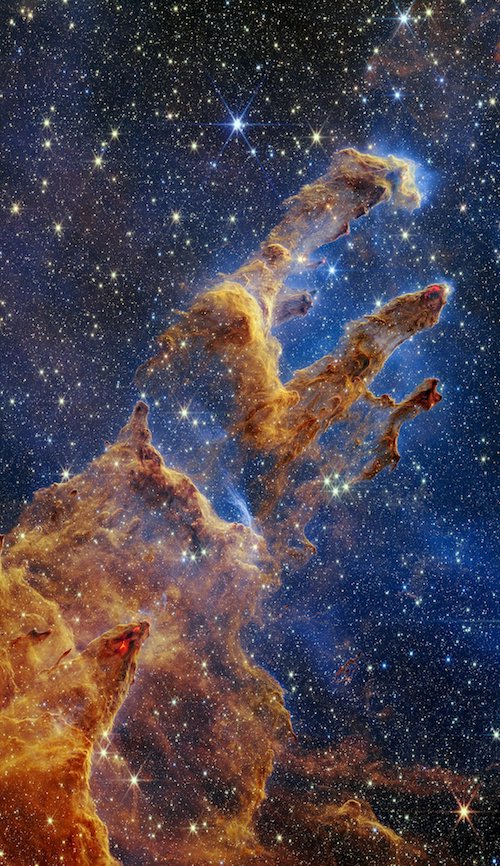


Support the Automatic Earth in virustime with Paypal, Bitcoin and Patreon.











